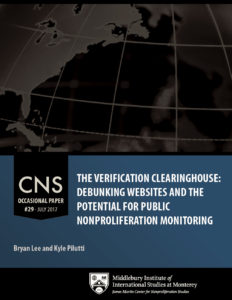August 4, 2017
Bryan Lee, Kyle Pilutti
Occasional Paper #29
Read the full Occasional Paper #29:
The Verification Clearinghouse: Debunking Websites and the Potential for Public Nonproliferation Monitoring
Executive Summary

The rapid pace at which information spreads online has been a boon for information gathering but poses risks with respect to the truth of the information. This risk increases with high-stakes information, such as treaty compliance judgements, and it is one of the main reasons why publicly available information is usually excluded from verification efforts.
Nevertheless, just as military and intelligence experts have developed techniques to counter deception, techniques to debunk online deception have grown in power and sophistication. Most of these techniques can be applied by a dedicated amateur and allow the user to identify manipulations of images, video, and audio. Coupled with the rise of open source analytical tools, there is now the potential to construct a “verification clearinghouse,” an online website that would allow both experts and members of the public to monitor and evaluate arms control treaties. There are a number of existing online debunking sites available to the public. The majority of them focus on smaller niche topics, such as sites dedicated to political fact checking or Internet hoaxes. In other cases, sites are maintained by enthusiastic experts who work to debunk cases that are of particular interest or importance to themselves or their fields.
These sites are important building blocks for future verification clearinghouse efforts. In our analysis, we characterize the existing attempts to address online deception, identifying the factors that make them particularly advantageous, and group them into three different types as shown below.
Types of Debunking Websites
| Academic | Bulk | Explanative: Global, Regional, Topical |
| Debunking sites that are focused primarily on isolated cases and which offer a high degree of analytical rigor. | Debunking sites that focus on addressing as many classes of possible deception as possible. | Debunking sites that focus on providing detailed cases that focus on the explanation of why or why not a case is deceptive. These sites can be separated into those focused on regional, topical, or global issues. |
Several technical and policy hurdles will need to be more fully resolved before a verification clearinghouse can be entirely implemented. Among the technical challenges are the difficulties of motivating participation, protecting against cheating, and the deception/counter-deception “arms race.” Policy challenges principally revolve around the ethical, legal, and social implications or “ELSI” concerns. Both sets of challenges can be overcome, and the concept of a verification clearinghouse as one tool in a broader arms control and nonproliferation toolkit is worthy of exploration.
